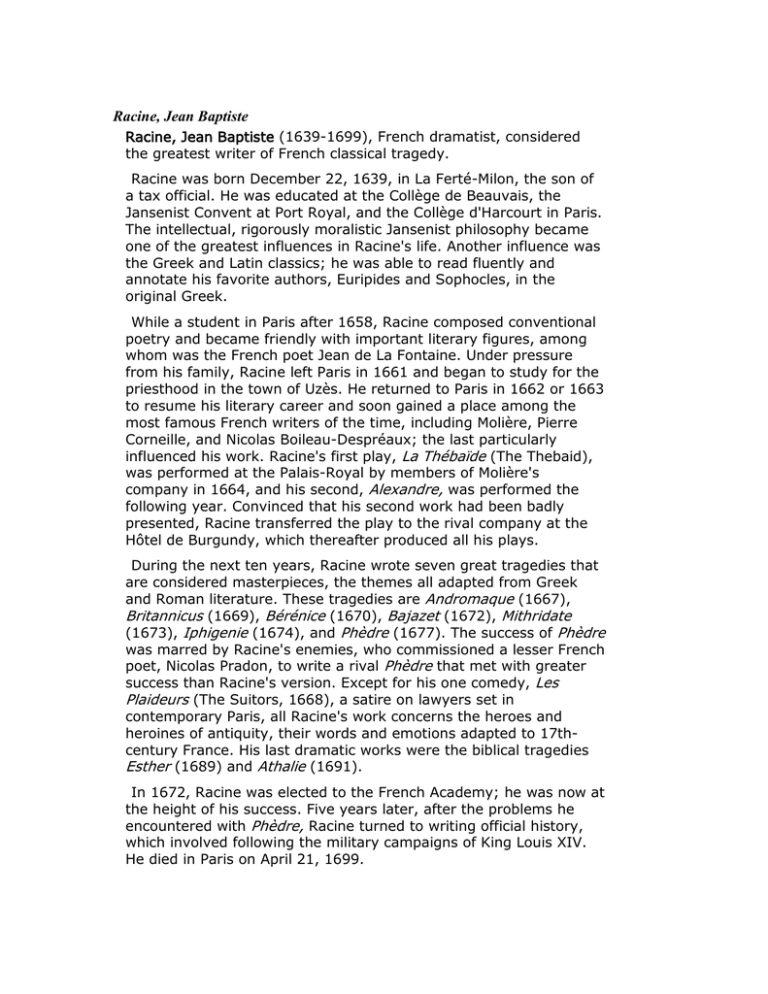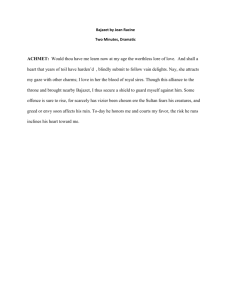
Racine, Jean Baptiste
Racine, Jean Baptiste (1639-1699), French dramatist, considered
the greatest writer of French classical tragedy.
Racine was born December 22, 1639, in La Ferté-Milon, the son of
a tax official. He was educated at the Collège de Beauvais, the
Jansenist Convent at Port Royal, and the Collège d'Harcourt in Paris.
The intellectual, rigorously moralistic Jansenist philosophy became
one of the greatest influences in Racine's life. Another influence was
the Greek and Latin classics; he was able to read fluently and
annotate his favorite authors, Euripides and Sophocles, in the
original Greek.
While a student in Paris after 1658, Racine composed conventional
poetry and became friendly with important literary figures, among
whom was the French poet Jean de La Fontaine. Under pressure
from his family, Racine left Paris in 1661 and began to study for the
priesthood in the town of Uzès. He returned to Paris in 1662 or 1663
to resume his literary career and soon gained a place among the
most famous French writers of the time, including Molière, Pierre
Corneille, and Nicolas Boileau-Despréaux; the last particularly
influenced his work. Racine's first play, La Thébaïde (The Thebaid),
was performed at the Palais-Royal by members of Molière's
company in 1664, and his second, Alexandre, was performed the
following year. Convinced that his second work had been badly
presented, Racine transferred the play to the rival company at the
Hôtel de Burgundy, which thereafter produced all his plays.
During the next ten years, Racine wrote seven great tragedies that
are considered masterpieces, the themes all adapted from Greek
and Roman literature. These tragedies are Andromaque (1667),
Britannicus (1669), Bérénice (1670), Bajazet (1672), Mithridate
(1673), Iphigenie (1674), and Phèdre (1677). The success of Phèdre
was marred by Racine's enemies, who commissioned a lesser French
poet, Nicolas Pradon, to write a rival Phèdre that met with greater
success than Racine's version. Except for his one comedy, Les
Plaideurs (The Suitors, 1668), a satire on lawyers set in
contemporary Paris, all Racine's work concerns the heroes and
heroines of antiquity, their words and emotions adapted to 17thcentury France. His last dramatic works were the biblical tragedies
Esther (1689) and Athalie (1691).
In 1672, Racine was elected to the French Academy; he was now at
the height of his success. Five years later, after the problems he
encountered with Phèdre, Racine turned to writing official history,
which involved following the military campaigns of King Louis XIV.
He died in Paris on April 21, 1699.
Racine is regarded as the supreme exponent of French classical
poetry in rhymed Alexandrine verse. His seven most famous
tragedies have remained in the repertory of the Comédie Française,
and the interpretation of their leading roles has been a standard test
for acting in France. Although Racine's dramas contain many
situations involving intense human passions, the strict neoclassical
formality of his lines, devoid of any spontaneous emotion, has
caused some critics to characterize his work as cold and artificial.1
1"Racine, Jean Baptiste."Microsoft® Encarta® Encyclopedia 2001. © 1993-2000
Microsoft Corporation. All rights reserved.




